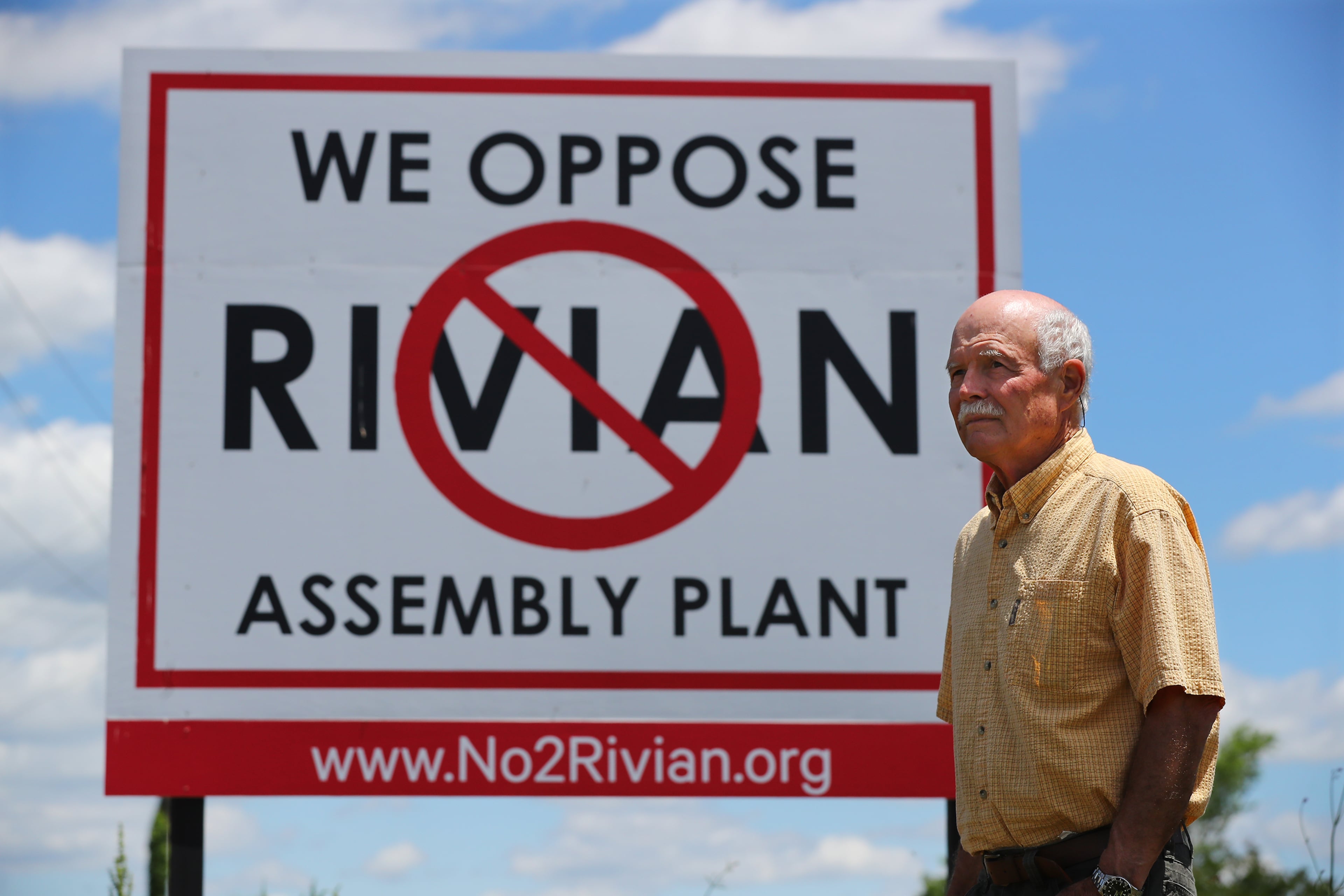Some candidates bashed the Rivian EV deal. Here’s how they fared.

Plans for a $5 billion Rivian electric vehicle plant an hour east of Atlanta have ginned up a passionate grassroots opposition movement.
But candidates who tried to channel the frustrations of residents near the future factory in rural Walton and Morgan counties generally found little success in last week’s primary elections.
Former U.S. Sen. David Perdue, who slammed Gov. Brian Kemp over the Rivian deal in his bid for the Republican nomination, went down in flames statewide and didn’t fare much better in the area of Rutledge and Social Circle where the factory is planned. A critic of Rivian in a local state Senate race also failed to gain much traction.
Two Morgan County commission candidates, meanwhile, who were both critical of the company, faced off against one another in the Republican primary, with one advancing to November’s general election against a similarly skeptical Democrat.
Few political observers expected the controversy surrounding Rivian’s plans to have any statewide impact, though it loomed large in local races heading into the primaries.
But the majority of voters who live on the rolling farmland and pine forests near the future factory likely weighed other concerns when they hit the polls, political experts said.

Georgia’s roaring economy was at the heart of Kemp’s campaign to fend off Perdue. To make his case, Kemp had both Rivian and a separate Hyundai EV plant to tout, along with record low unemployment.
Perdue centered his campaign on false allegations of fraud in the 2020 election, echoing his biggest benefactor, former President Donald Trump. But Perdue also routinely slammed Kemp in debates and on the stump about the Rivian project.
At a small rally in May in Morgan County, Perdue called the $1.5 billion package of tax breaks and incentives offered to Rivian by state officials “maybe the worst deal I’ve seen in my 40-year business career.”
Still, Perdue was trounced statewide and results show his embrace of the Rivian opposition did little to dampen Kemp’s support near the future plant.
In Morgan County, where much of the land Rivian plans to develop is located, Kemp captured 68% of the vote, compared to 73.7% statewide. Kemp’s support in the primary in Morgan County lagged behind his 2018 primary runoff performance against then-Lt. Gov. Casey Cagle, when Kemp won 78% of the vote. Kemp tallied 71% of the vote that November against Democrat Stacey Abrams.
Political experts said Perdue’s approach was surprising, given Georgia Republicans’ long history of framing themselves as a staunchly pro-business party.
Charles Bullock, a University of Georgia political scientist, said it’s possible the Rivian deal cost Kemp some votes in Morgan County, but “I don’t think it caused any second thoughts on Brian’s part.”

Daniel Franklin, a professor of political science at Georgia State University, said the Rivian deal was probably an afterthought to most voters. Instead, he said their decisions were more likely shaped by the issue at the heart of Perdue’s campaign: the 2020 presidential election.
“I believe that voters chose to reject, overwhelmingly, (former) Senator Perdue more as a function of a rejection of President Trump and his attempted interference in Georgia’s election, than in reaction to a particular policy issue,” said Franklin.
Blake McCormack, a Republican running for the District 2 seat on Morgan County’s commission, said he was not surprised by how much of the vote share Kemp still captured in the county. He said most Republicans voted pragmatically, believing Kemp still has the best shot of defeating Abrams this fall.
“I think everyone is pretty realistic about the fact that even though Kemp was not in touch with our feelings on (Rivian), it was pretty obvious that he was the only (viable) candidate on the Republican ticket,” McCormack said.
Anti-Rivian sentiment did figure into some local races.
Republican Brian Mauldin, a businessman who appeared at Rivian opposition rallies, was soundly defeated by incumbent state Sen. Brian Strickland in the Senate District 17 race. Strickland largely stayed mum on the subject.
Despite the election defeats, Rivian’s plant remains a controversial topic near the future plant site.
Rivian opponents packed a recent Morgan County Board of Assessors meeting when members voted to approve a key part of of the state’s incentive package.

John Strickland, a Rutledge resident who moved to the area from Gwinnett County, said he is “100% against” the Rivian plant.
“I know first-hand about the crime and the traffic problems that come with uncontrolled growth,” he said. ”That’s why my wife and I moved down here.”
Bullock said it’s doubtful that Rivian’s factory becomes campaign grist in the general election battle between Kemp and Abrams, given Democrats’ support for electric vehicles and other climate change mitigation strategies.
But the company’s arrival will likely remain an issue in some Morgan County commission races, especially the contest for the District 2 seat, which includes much of the land where Rivian plans to build. Both the Democrat in the race, Bob Baldwin, and the Republican, McCormack, have decried the lack of community involvement in shaping the project.
Staff writer Kelly Yamanouchi contributed to this report.
A note of disclosure
Cox Enterprises, owner of The Atlanta Journal-Constitution, also owns about a 4% stake in Rivian and supplies services to the company. Sandy Schwartz, a Cox executive who oversees the AJC, is on Rivian’s board of directors and holds stock personally. He does not take part in the AJC’s coverage of Rivian.


